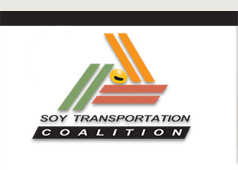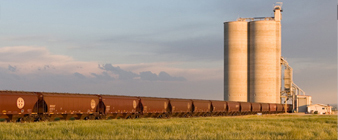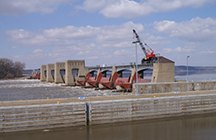 |
 |
|
| eNews • November 2015 | ||
| Promoting a Cost-Effective, Reliable and Competitive Transportation System |
||
 The Mississippi Basin Receives a Poor Grade
The Mississippi Basin Receives a Poor Grade
The Mississippi River Basin recently received poor marks as scientists, trade groups and manufacturers weighed in on the Big Muddy’s bad report card.
America's Watershed Initiative, a coalition of 700 stakeholders and 400 corporations, government agencies and science organizations, released the scathing assessment of “Old Blue.”
While water quality and economic conditions received a C, the check-boxes for recreation management, ecosystem health and flood control were given D plusses.
Transportation infrastructure was hit even harder with a D minus, with most locks-and-dams along the river being called “inadequate or failing.”
Mike Steenhoek, Exec. Director, Soy Transportation Coalition.,” We haven't invested properly in it and we're seeing the results of that it is falling into disrepair and really it's not a matter of if we will have a catastrophic failure at one of these lock and dams, it's really question of when.”
With harvest season well underway, commodity groups are echoing those concerns, saying U.S. commodity export sales could be severely damaged if problems with the aging and vital infrastructure are left untouched.
The Soy Transportation Coalition, a trade advocacy group representing partners in 13 states, says the economic vitality of U.S. commodities are dependent on cost effective transportation.
Mike Steenhoek, Exec. Director, Soy Transportation Coalition, “When your customers are located next door transportation isn't that important if your customers allocated halfway around the world transportation becomes essential to your profitability.”
Farm trade groups have been calling for attention to be paid to the ailing water transportation system for decades, saying the need for a more secure and diverse transportation system is the key to staying competitive.
America’s Watershed Initiative is an alliance of individuals representing public-private partnerships across the 31 states that make up the basin. Representatives from the agricultural manufacturing sector joined several universities and governmental agencies assess the health of the 4th longest river in the world.
“The Mississippi River Watershed is a world-class asset to our nation, and we need to significantly improve information and management systems to make more informed and efficient decisions to improve its condition.”
Poor marks also were given to flood control and flood risk reduction. However, the Upper Mississippi Basin received high marks for its economy. But environmental issues centering on the “Dead Zone” in the Gulf of Mexico and losses to coastal wetlands wrecked the curve.
After the bad grades were delivered, stakeholders presented a three year action plan to get the “Mighty Miss” out of academic default. Additional details are expected to be released in the months ahead.
Source: Market to Market (Iowa Public Television)
Soy Transportation Coalition |
|
